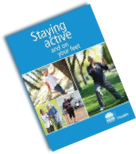Healthy eating supports good health and wellbeing throughout life. But as we get older, our nutritional needs change. Changes to our lifestyles and appetites can also make it harder to get the nutrients our bodies need. This means that as we age, we may need to eat a little differently to support good health.*
The benefits of healthy eating for older adults
Eating healthily as you get older has many benefits. It can help to:
- maintain your energy levels, focus and concentration
- keep your bones and muscles strong and help prevent osteoporosis
- lower your risk or manage chronic diseases like heart disease and diabetes
- support healthy digestion and bowel function and help prevent constipation
- help you achieve and maintain a healthy weight.
It’s never too late to start eating healthily. Even small changes can make a big difference to your health and disease risk. If you’d like some support to do this, our free Healthy Ageing Online Learning or Get Healthy Service health coaching program can help.
Practicing some of the below simple habits can help you get enough of the right nutrients to help you thrive as you get older.*

